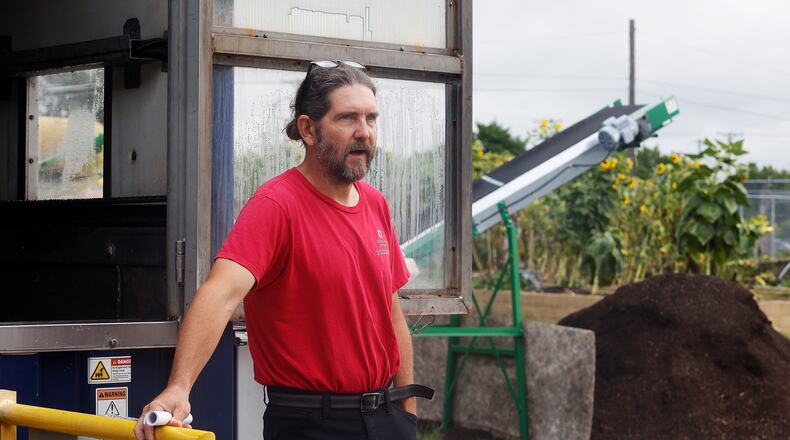“We provide food to the community. We view composting and eliminating food waste, reducing food waste as a mechanism to help solve some of our issues around hunger,” said James Hoffer, garden manager for Foodbank Inc.
The Montgomery County commission last week approved the Foodbank’s application for the U.S. EPA grant geared toward environmental and climate justice and reducing food waste. The funding, which would require no local match, would cover program expenses for three years. If approved, the project could begin hiring next year and be fully implemented by 2026.
The program would include 32 drop-off locations throughout Montgomery County and six in-vessel compost systems in partnership with Montgomery County Environmental Services’ Solid Waste District, according to Hoffer. In its initial phase, several jobs would be created for the program, and Foodbank Inc. would partner with the Montgomery County Office of Reentry to hire out positions for the collection of food waste and composting. Roughly $800,000 of the grant would go to the Foodbank, while the remainder of the grant would go to Montgomery County for infrastructure and hiring around the initiative.
The Montgomery County Office of Reentry provides programs and services to men and women who are returning to Montgomery County from incarceration.
Roughly 45% of staff at Foodbank Inc. has been involved with the criminal justice system, said executive director Michelle Riley. She’d like to see that percentage increase and believes the entire community benefits from returning citizens finding supportive employment.
“Our model is built on trust, respect, accountability and inclusivity,” she said. “And employment is a social determinant of health.”
Foodbank Inc. has been using its composter since 2019. The food bank also operates a bucket program, which allows more than 300 residents to drop off their food waste for composting.
The bucket program sees up to five tons of food waste come to Foodbank Inc. monthly.
Compost made from food waste, Hoffer said, is four to five times more nutrient dense than manure or compost made from yard waste. The food bank uses its compost for its garden space, which is the growing space for fruit, vegetables and herbs that can be used for Foodbank Inc. clients.
The program will allow food waste, initially only at the residential level, to be reused as something that will benefit the food system instead of sitting at an area landfill, Hoffer said. As the program grows, Foodbank Inc. officials plan to expand the public service to commercial participants, like restaurants.
Residents of Montgomery County could then come to their regional food bank to access free compost for their own garden spaces or for use at community gardens.
Barriers often exist for lower-income families who want to engage with initiatives that benefit the environment, as curbside composting services are often costly. Foodbank Inc. views the program as a part of public works, Hoffer said.
A negative perception of composting at times exists, too; particularly, complaints surround the smell of the material.
“We want to show people that compost can be a good neighbor,” Hoffer said.
About the Author



